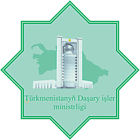Magtymguly Fragi»




On January 23, 2024, a High-Level Briefing to Member States on UN Office of Counter-Terrorism's projects in Central Asia was organized at the UN headquarters.
The briefing was attended by Under-Secretary-General and Head of the United Nations Office of Counter-Terrorism (UNOCT) Vladimir Voronkov, Executive Director of the Executive Directorate of the UN Counter-terrorism Committee (UN CTC) Natalia Gherman, Special representative of the UN Secretary General, Head of the UN Regional Center for Preventive Diplomacy for Central Asia Kaha Imnadze, Permanent Representatives of Central Asia and wider UN membership.
Opening the event, USG noted that the Central Asian states continue to increase their individual and collective efforts to prevent and counteract terrorism and violent extremism at the national, regional and international levels within 15 programs implemented in the region currently from the UN OCT.
He emphasized that the Governments of the Central Asian countries demonstrate their commitment to collective actions in preventing and counteracting terrorist threats and fulfilling relevant international obligations.
V.Voronkov thanked the donor states, including Turkmenistan, for the valuable contribution and financial support of the activities of the UN OCT and noted that voluntary contributions are the main source of financing the UN activity in this direction and play a key role in ensuring an effective combating of terrorism.
The significance of the current early warning network to combat terrorism in the region creating the basis for systematization of information exchange, as well as the coordination of the work of various national and regional structures operating in this area in Central Asia and neighboring countries, was noted.
In her statement, Ambassador A.Ataeva noted that Turkmenistan continues to decisively and comprehensively implement a five-year national strategy and an action plan to prevent violent extremism and fight terrorism, adopted in 2020 with the support of the UN OCT team in Ashgabat.
A.Ataeva emphasized that early warning and preventive activities, in particular the newly established early warning network, as well as ensuring the safety and stability of energy and transport infrastructure in the context of terrorist threats, remain priorities. The readiness to carry out practical assistance to the UN structures in the further implementation of the above initiatives was noted.

